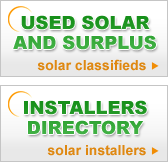Solar water heater loan program:
-This program provides loans which cover the full equipment
and installation cost of solar water heaters.
-Loans require a 5% down payment upon approval.
-Interest rates and terms vary.
Renewable energy state tax credit:
-Residents of Kentucky who install renewable systems
on their property such as solar space heat, solar water heat and heating
systems, wind turbines and geothermal heat pumps may take a 30% state
income tax credit for installations on these technologies.
-Maximum incentives are as follows; $500 for solar and wind installations
and $250 for geothermal installations.
- PV systems are allowed a tax credit of $3.00/watt for rated capacity.
-All systems must meet specified requirements to qualify.
-Tax credits may be forwarded to one year.
Green power switch generation partners program
– TVA:
-Tennessee Valley Authority offers a production incentive
for installing solar photovoltaics, wind, low impact hydropower, and
biomass to customers of participating TVA power companies.
-Green power switch is TVA’s green pricing program which provides
technical support and incentives for installing renewable energy systems.
-Through this program, TVA purchases the solar energy output at $0.12
per kilowatt-hour and all other renewable energy at $0.03 per kilowatt-hour.
-Payments are made in the form of a credit on the local participating
utility’s monthly bill.
-All new participants of the green power switch generation partners
program will receive a $1000 incentive to help offset initial cost
of the system.
Net metering:
-Net metering is available to residents who have renewable
energy equipment such as solar, wind, geothermal, biomass or hydroelectric
power that is capable of calculating the flow of electricity in two
directions.
-The net excess generation is given to the customer at the utilities
retail rate as a credit on the customer’s next bill.
-Maximum capacity is set at 30 kilowatts.
Residential renewable energy tax credit:
-This federal personal tax credit allows the taxpayer
to claim a credit of 30% of expenditures including labor costs and
installation of qualified residential solar-electric systems, solar
water heating systems or fuel cells. Small wind-energy systems and
geothermal heat pumps can also be accredited for.
-Solar-electric systems and solar water heaters have a maximum incentive
of $2,000 if placed in service before 2009. There is no maximum incentive
for systems placed after 2008.
-The excess amount of the federal tax credit may be carried forward
to the next taxable year if it exceeds tax liability.
-This can be carried forward until 2016, but after that, it is unknown
if the unused credit will be able to be forwarded.
Residential energy conservation subsidy exclusion:
-This is a personal exemption of 100% of energy conservation
subsidies provided by public utilities.
-The value of a purchase or installation of any energy conservation
measure by a customer such as solar water heat, solar space heat or
photovoltaics will not be included in the customer’s gross income.
-Customers of an electric utility company, who participate in the
utility’s energy conservation program, may receive a rate reduction
of electricity furnished or a nonrefundable credit against the purchase
price of the electricity on each monthly electric bill.
Energy-efficient mortgages:
-This is a federal loan program where homeowners can
use EEM (energy-efficient mortgages) to finance renewable energy technologies
in a home.








